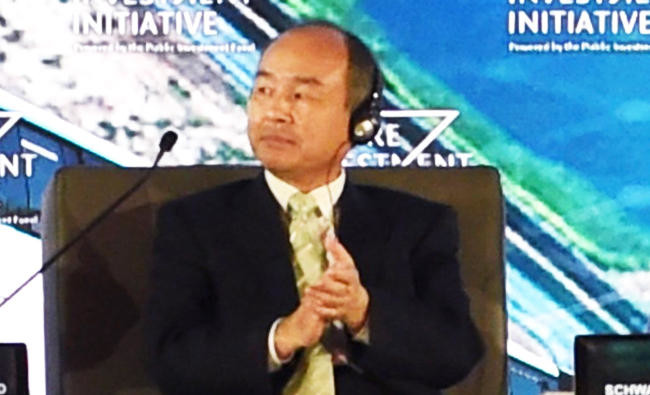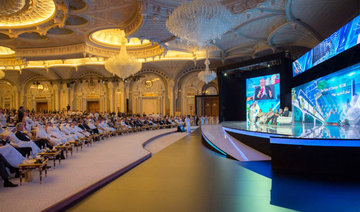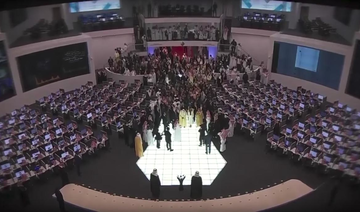RIYADH: Masayoshi Son, the partner of Saudi Arabia’s Public Investment Fund, revealed that his Vision Fund has made a return of 22 percent in its first five months of operation and turned in a profit of $3 billion.
Now he is ready to launch similar funds in the near future.
Son, also founder and chief executive of SoftBank of Japan, told the Future Investment Initiative in Riyadh that now was the time to invest in the hi-technology sector because the future prospects of artificial intelligence and robotics were so positive.
“This is just the start for tech valuations. I would not call it a peak at all, it is just the beginning,” he said, contrary to some expert predictions of a “bubble” in technology valuations.
PIF pledged to commit $45 billion to the Vision Fund.
Son said that the fund had made some 15 investments in its first five months.
“People said that $100 billion is too much to put into a single fund, but I say it’s too little. I would like to do more of a similar size.
“The next one will not take five years. Each fund will be roughly the same size, but we will launch them more frequently,” he said.
“People call me an optimist, people say I’m crazy, but I take it as a compliment,” he said.
Son, who almost went bankrupt in the dot com bust of 2000, said that then was the perfect time to invest in hi-technology. “If I had any money, I would have bought then,” he said.
He was speaking after Crown Prince Mohammed bin Salman unveiled plans for a $500 billion megacity called Neom in the north west of the country bordering Jordan and Egypt.
“I’m very excited to be part of Neom, and by the role we will be playing in it with the Kingdom,” he added.
He also told how the Crown Prince had first talked to him about technology investment in Tokyo.
“People says that I convinced him to put $45 billion into the fund during a 45 minute conversation, but that is not how it happened. He already had the idea to go for artificial intelligence, robots and super technology, and we found we had a lot in common. That’s how we created a friendship, partnership and a bonding of the mind,” he said.
“It is a great dream. All the dreamers come to a new place, and we will create that at Neom,” Son said.
He mapped out a future for the business world where artificial intelligence and robotics would become the driving commercial forces.
“Ten years ago, the only technology company in the top ten biggest in the world by market capitalization was Microsoft. Today, there are seven tech companies in that list, and two of them are Chinese,” he said.
“Artificial intelligence will redefine every industry. The Internet is only a small part of the big change. AI will revolutionize all sectors,” he added.
SoftBank books $3 billion in first 5 months of partnership with Saudi PIF
SoftBank books $3 billion in first 5 months of partnership with Saudi PIF

Enforcement of penalties for performing Hajj without a permit begins

- The no-permit, no-Hajj policy will be in effect until June 20, 2024
RIYADH: Saudi Arabia’s Public Security has began imposing penalties on pilgrims violating Hajj regulations and instructions by undertaking a pilgrimage without a permit.
The areas covered by the no-permit, no-Hajj policy include the city of Makkah, the central area, the holy sites, the Haramain train station, security checkpoints, screening centers and temporary security checkpoints, according to a report from state news agency SPA.
The rule will be in effect until June 20, 2024.
Any individual – whether citizens, residents, or visitors – found violating Hajj regulations would be fined 10,000 Saudi riyals ($2,666), and non-citizens would be deported to their home countries and banned from re-entering the Kingdom for a certain period as specified by laws.
The Public Security also said that repeat offenders would have their fines doubled, as the agency stressed the importance of adhering to Hajj regulations and instructions to ensure that the pilgrims can perform their rituals safely and peacefully.
Furthermore, any individual caught transporting Hajj violators without a permit faces imprisonment for up to 6 months and a fine of up to 50,000 riyals (13,328), and the vehicle used for transportation would be confiscated.
If the violator is a resident, he will be deported after serving the sentence and barred from re-entering the Kingdom for a specified period, in accordance with the law, Public Security said.
The fines would be multiplied according to the number of transported violators, the agency added.
To report such violations, contact (911) in the Makkah, Riyadh, and Eastern regions, or (999) in other regions of the Kingdom.
Al-Aan Palace: a lofty landmark of Najran’s heritage

- Constructed in 1688 using traditional practices that incorporated the use of mud and natural resources
RIYADH: Najran’s ancient citadel, Al-Aan Palace, is a landmark of Najrani architecture and heritage. With its unique design, the structure has become a magnet for tourists visiting the southern region to explore its history and culture.
Najran, in the southwest of Saudi Arabia, is a region known for its vibrant culture and rich history. Surrounded by the Sarawat Mountains, it stands out for its mudbrick architecture, winding streets and bustling souks.
Al-Aan Palace — also known as Saadan Palace, because it is situated in the village of Saadan — was built in the 1600s on top of Al-Aan Mountain, and its inhabitants would have enjoyed a mesmerizing view of the surrounding landscape.
Saudi architect Khalid Al-Ojyan, from the Royal Commission of Riyadh City, told Arab News about the concept behind the palace and how it was built.
“Al-Aan Palace is a heritage landmark in Saudi Arabia,” he said. “(It) was built in 1100 AH (1688) by Shaikh Mohammad Ismail and HibatuAllah Al-Makrami, the governors of the region.”
Najani architecture was heavily influenced by the natural materials available, Al-Ojyan said. The mixture of rocks and mud created mudbricks, which have been commonly used in the region for centuries.
The palace was largely constructed using these mudbricks, although other natural materials also feature. For example, the ceilings showcase the intricate use of natural materials such as wood from palm tree trunks as well as tamarisk and sidr trees, along with palm fronds, highlighting the region’s reliance on its natural resources and the craftsmanship of its builders.
The circular and rectangular towers surrounding the palace were likely added for strategic defense purposes, Al-Ojyan said.
He highlighted the shape and size of the palace windows, which were also designed to provide protection. On each of the palace’s four stories, the window size increases. The lower levels of the building were designed with smaller windows to protect against intruders.
The palace was renovated by the Saudi Heritage Commission five years ago, both externally and internally, the architect added.
The palace’s architectural features — the mudbrick construction, the use of other natural materials, and its defensive features — all contribute to the experience that Al-Aan Palace provides for visitors while showcasing the culture, heritage, and ingenious building practices of Najran.
Saudi ambassador receives UN’s terror prevention head in Vienna

Saudi Arabia’s Ambassador to Austria and Permanent Representative to the United Nations Industrial Development Organization Dr. Abdullah bin Khalid Tawlah received Roberto Arbitrio, chief of the United Nations Office on Drugs and Crime’s terrorism prevention branch, in Vienna recently.
During the meeting the two men discussed the possibilities of future cooperation between the Kingdom and the UNODC.
Tawlah also met with Doaa Hassan Mirah, the general manager of training and tourism programs at the Saudi Ministry of Tourism, during her visit to Austria.
Who’s Who: Feras Nasrallah, director-general at Saudi Export-Import Bank

Feras Nasrallah is director-general of business enablement and studies at Saudi Export-Import Bank.
He began his tenure at Saudi Exim in January 2021 as a member of the founding team, contributing to the bank’s establishment and operational setup.
As a senior executive adviser, he played a crucial part in forming strategic partnerships, developing governance frameworks, and launching financial products and services that aligned with market demands and the bank’s strategic goals.
In his current role, Nasrallah leads several functions, including business development, enhancing Saudi Exim’s global presence by managing client relationships, and sourcing new leads with local and international financial institutions, as well as domestic and foreign business entities.
He is also involved in financial restructuring to provide solutions for clients facing financial challenges, economic advisory and market research, and other non-financial services.
Nasrallah is a seasoned financial executive with 13 years of experience spanning project finance, trade finance, and international trade.
His understanding of export-import dynamics and strategic financial management has positioned him as a valuable contributor to advancing economic development and fostering international collaborations.
Nasrallah’s career began at Saudi Industrial Development Fund as an assistant credit analyst. He then moved on to the role of team leader, managing a range of credit portfolios, conducting in-depth loan evaluations, and recommending strategic credit decisions.
As head of the specialized lending division, he leveraged the Saudi fund’s track record and expertise to support credit initiatives for programs related to Saudi Vision 2030.
Nasrallah has extensive experience in project and trade finance, managing credit for SME clients and large-scale infrastructure projects.
He holds a bachelor’s degree in business administration with a focus on finance from Marquette University in the US. He has also completed professional training programs in credit analysis, leadership, and strategic management at institutions such as the London Business School and J.P. Morgan Chase.
Saudi Arabia condemns Israeli attempts to undermine UNRWA efforts

RIYADH: Saudi Arabia on Saturday condemned attempts by Israeli authorities to undermine efforts of the UN Relief and Works Agency for Palestine Refugees by labelling it a terrorist organization.
In a statement, the Ministry of Foreign Affairs said that Israeli criticism of UNRWA seeks to strip “immunity from employees who are doing their duty to alleviate the severity of the humanitarian catastrophe that the Palestinian people are going through.”
The ministry said that Israel must abide by international law and stop obstructing the work of international organizations.
On Friday, UNRWA chief Philippe Lazzarini called on Israel to stop its campaign against the organization, saying: “Israeli officials are not only threatening the work of our staff and mission, they are also delegitimising UNRWA by effectively characterising it as a terrorist organization that fosters extremism and labelling UN leaders as terrorists who collude with Hamas.”
UNRWA, which coordinates nearly all aid to Gaza, has been in crisis since January, when Israel accused about a dozen of its 13,000 Gaza employees of being involved in the Oct. 7 attack.
(With AFP)






















